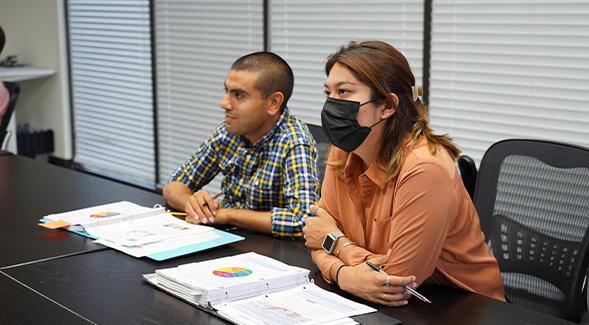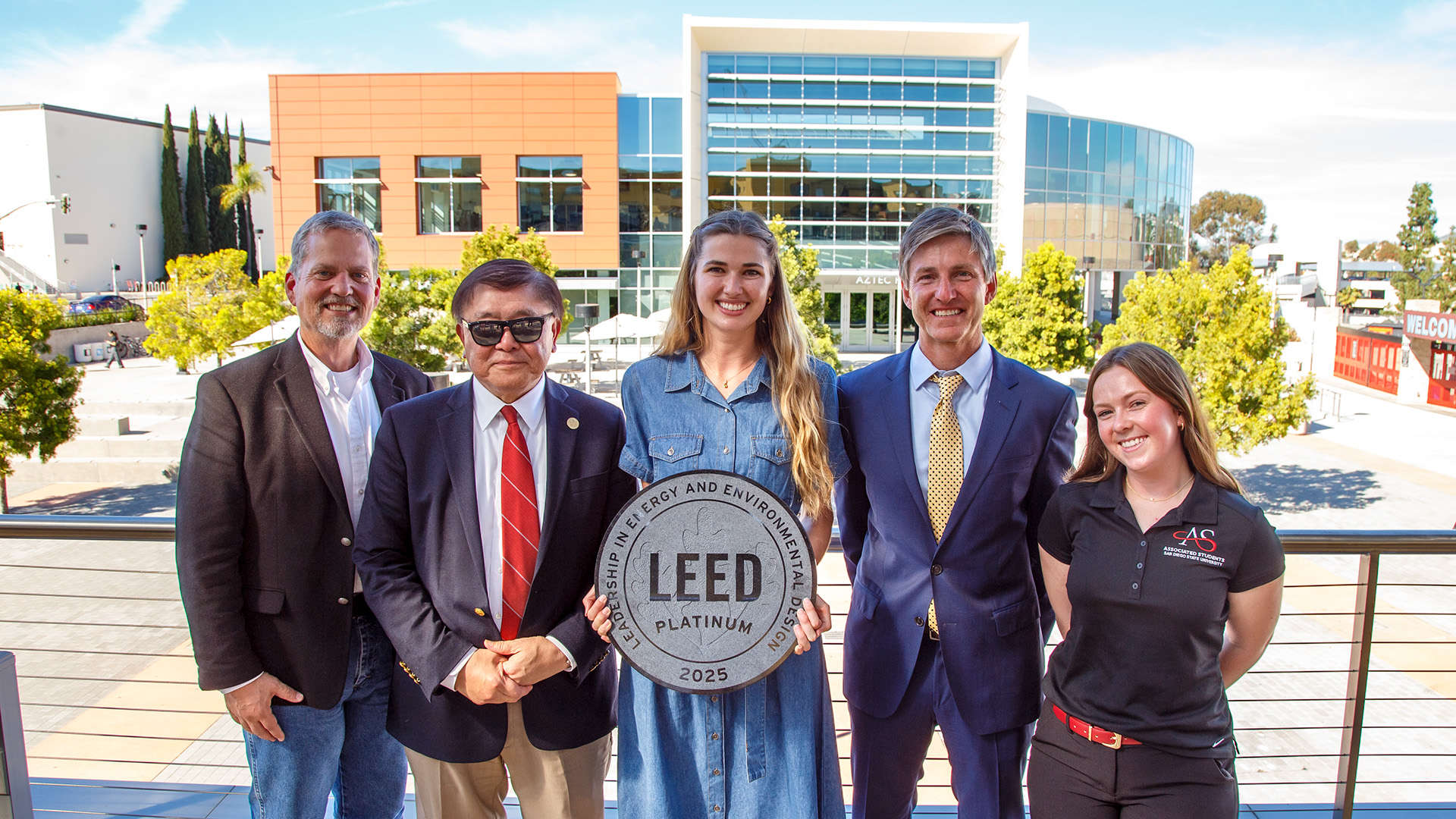Where Research Meets Practice
College of Education autism researchers make an immediate impact on lives through partnerships with schools and communities.

The article first published in the 2022 edition of Highlights: A Magazine of Research, Scholarship and Creative Activities at SDSU.
For the growing ranks of autism researchers in San Diego State University’s College of Education, a lab coat is not required. A few other things, however, are not optional.
Like deep school and community partnerships.
Like an unwavering focus on bridging the gap between research and practice.
Like a passion for meeting the most pressing needs of autistic people and their families.
“So many people are really, truly touched by the research that we do,” said Rachel Haine-Schlagel, interim associate dean for research in the college. “We're directly impacting the community and the workforce on multiple levels, whether by developing people who can work effectively with autistic children and their families or by creating services that are reaching the community.”
The rate of autism diagnosis in the U.S. continues to grow, reaching 1-in-44 eight-year-olds according to recent data from the Centers for Disease Control and Prevention. It’s against this backdrop that the College of Education’s ranks of faculty members working in the autism area has swelled in the past decade to more than a dozen spread across five departments.
They focus on developing and improving services and service delivery for autistic individuals at different stages of life — from toddlers to K-12 students, to young adults. Their goal is to positively impact outcomes in education, employment, independent living, mental health and other areas.
The services under the metaphorical microscope are known as interventions — direct service activities designed to be delivered by psychologists, behavioral specialists, speech-language pathologists, occupational therapists, classroom teachers, educational specialists, parents and others. For young children, this could mean play-based coaching strategies for parents, aimed at building social communication skills. For young adults transitioning out of high school, this could mean a curriculum that teaches workplace-related soft skills.
During the 2021-22 academic year, education faculty secured more than $2.1 million in funding for 13 research and training projects relating to autism. Funders include the U.S. Department of Education, the National Institute of Mental Health (NIMH) and the Institute of Education Sciences (IES).
By both training the interventionists and ensuring the efficacy of the interventions, SDSU faculty are taking a dual role in ensuring quality services for autistic people.
“I think there is a very clear connection between our research and the role of SDSU as an educational facility focused on personnel preparation,” said Laura J. Hall, professor and chair of the Department of Special Education. “We carefully evaluate how to prepare personnel to support autistic students and learn how to do it well.”
Supporting Young Adults
Mary Baker-Ericzén’s research is deeply embedded in the community, with organizations like San Diego Regional Center (SDRC) and the California Department of Rehabilitation (DOR) supporting her work. But the postsecondary education researcher said equally-critical partners come from within the autistic community itself.
“We have a very large team of autistic adults and families who inform every aspect of my research,” she said. “Their voices are heard at every stage of the program and they ensure the project will have a lot of relevancy.”
Baker-Ericzén develops and evaluates services geared to help autistic young adults build the skills needed to enter careers and higher education and — ultimately — lead fulfilling lives on their own terms. Curricula include lessons on cognitive executive functioning, social and communication skills, emotional regulation and self-determination.
“It's the set of soft skills that our population now calls ‘adulting,’” she said.
Her newest project is an NIMH-funded multi-site study being done in collaboration with Portland State University and Vanderbilt University. Baker-Ericzén and her team plan to enroll 800 autistic adults as participants in the study, which will develop a set of autistic-informed measurement tools to use in community services designed to address mental and medical health, social support, quality of life, employment satisfaction and more.
Baker-Ericzén notes that these measures were developed or adapted with input from autistic adults and their families, service providers and researchers.
In the Schools
SDSU’s Department of Special Education is home to Project EXPRESS, a federally-funded collaboration with the University of North Carolina (UNC)-Chapel Hill. Hall, Bonnie Kraemer and Kelsey Dickson, are part of the five-year study to compare the efficacy of two programs — one focused on executive function and the other on social skills — on autistic middle school students in San Diego County and central North Carolina.
But Project EXPRESS is taking it a step further, performing an additional study to learn what factors — such as teacher quality, levels of school support and staff attrition — might help or hinder successful implementation.
“These are all the supplementary factors that are often not asked,” Hall explains. “Typically, published studies are about ‘What did you do? What did the research say is needed? What were the outcomes? But you end up missing some of the key ingredients.”
SDSU’s partnership with UNC began in 2014 when Samuel L. Odom, a senior research scientist at the UNC Frank Porter Graham Child Development Institute, was seeking a West Coast partner for a project aiming to develop programs for autistic high school students.
“I had worked with SDSU colleagues on other projects and was familiar with their skills as researchers and their strong relationships with the local schools,” Odom said. “Their participation greatly strengthened the project.”
Services for Toddlers
Since 2013, eight researchers with backgrounds in autism services have joined the College of Education from the Child and Adolescent Services Research Center (CASRC) — a multi-institutional consortium of leading California research institutions. The group includes Sarah Rieth, an expert in early autism intervention for young children.
What prompted her and her CASRC colleagues to make SDSU a home base?
“I think a lot of it is San Diego State's emphasis on applied research that truly impacts the community and is about the community,” said Rieth.
Rieth is currently studying the efficacy of Project ImPACT, a parent-coaching intervention for toddlers at risk for autism. In partnership with San Diego area providers, she compares how children respond to existing services to how they respond when their family receives Project ImPACT. In the process, she trains the interventionist to use Project ImPACT with families.
“The main activities in my research right now are connecting with agencies that are delivering services to families in the community,” Rieth said. “My focus is on ensuring these interventionists are effective when they work with families.
“This is not ivory tower research,” she adds. “It’s about actually impacting the world around us.”



